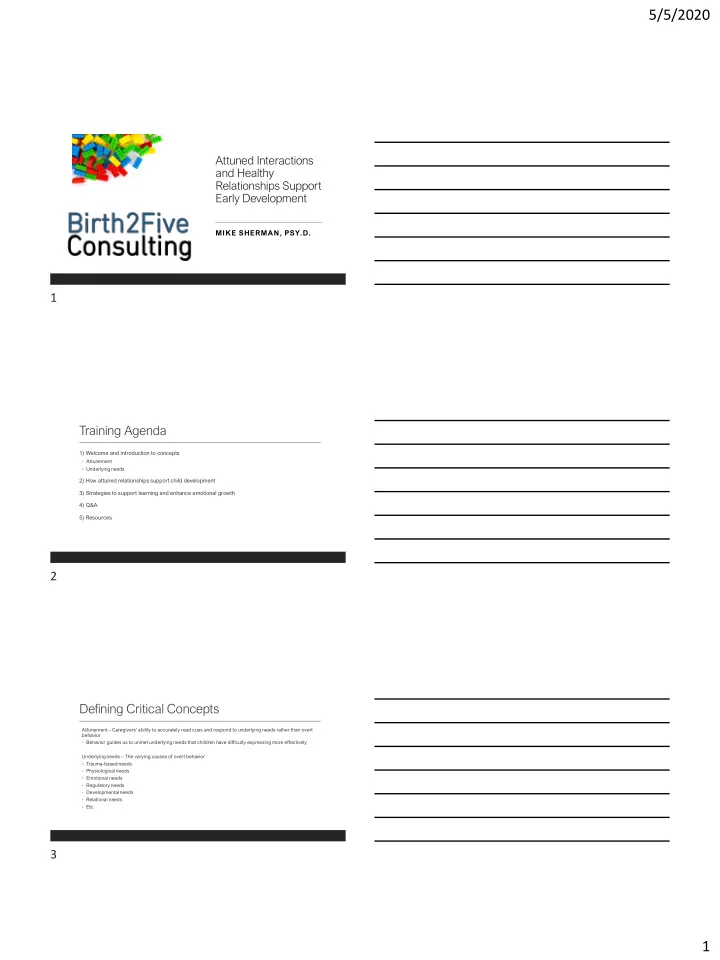

5/5/2020 Attuned Interactions and Healthy Relationships Support Early Development MIKE SHERMAN, PSY.D. 1 Training Agenda 1) Welcome and introduction to concepts ◦ Attunement ◦ Underlying needs 2) How attuned relationships support child development 3) Strategies to support learning and enhance emotional growth 4) Q&A 5) Resources 2 Defining Critical Concepts Attunement – Caregivers’ ability to accurately read cues and respond to underlying needs rather than overt behavior ◦ Behavior guides us to unmet underlying needs that children have difficulty expressing more effectively Underlying needs – The varying causes of overt behavior ◦ Trauma-based needs ◦ Physiological needs ◦ Emotional needs ◦ Regulatory needs ◦ Developmental needs ◦ Relational needs ◦ Etc. 3 1
5/5/2020 4 The Process of Brain Development Brains are built over time, shaped by the interaction between genetics and experience. ◦ Epigenetics - Our genes are expressed differentially based on our experiences. Brain plasticity decreases over time. ◦ Because of this, “dosage” required to foster positive change is increased over time. ◦ The answer is not “more therapy” or “more teaching,” but “more attuned and therapeutic interaction.” 5 Birth 6 Years 14 Years The Process of Brain Development (cont.) Rethinking the Brain, Families and Work Institute, Rima Shore, 1997. 6 2
5/5/2020 Relationship is the Blueprint for Building Brains Nurturing and responsive relationships build healthy brain architecture that provides a strong foundation for life-long learning, behavior, and health. When protective relationships are not provided, elevated levels of stress hormones (i.e., cortisol) disrupt brain architecture by impairing cell growth and interfering with the formation of healthy neural circuits. 7 Relationship is the Blueprint (cont.) In the context of secure and nurturing relationships, the brain organizes around exploration of the environment. In the context of neglect and volatile, disorganized relationships, the brain organizes around self-preservation. 8 Healthy attachment sequences promote development and learning 9 3
5/5/2020 Unhealthy attachment sequences can lead to regression and impair development and learning 10 Strategies to Support Learning and Enhance Emotional Growth 11 The Importance of Resiliency Resilience factors have been shown to offset the negative impact of adverse childhood experiences, toxic stress, and trauma. Some factors to consider include: • Parental resilience & reflective capacity • Social connection • Concrete support in times of need • Healthy social and emotional development • Close relationships with competent caregivers or other caring adults 12 4
5/5/2020 The Regulatory Power of Routines For children struggling with global dysregulation Consider integrating short, predictable, repetitive patterned interactions throughout the day Examples: ◦ Touch ◦ Rhythmic Activities ◦ Eye Contact ◦ Drumming Use observations of child’s behavior for clues to what strategies work best 13 The Regulatory Power of Routines (cont.) For children struggling with hyperactivity and inattention Consider beginning the day with predictable, structured, patterned, rhythmic music and movement activities. Studies indicate that children have increased self-regulation throughout the day when sensory integration occurs early. Examples: ◦ Gross Motor and Fine Motor Activities ◦ Music and Movement 14 The Regulatory Power of Routines (cont.) For children struggling with emotional dysregulation Consider that social development requires scaffolding and for some children we may need to back up and purposefully create opportunities for parallel play or learning in a dyad with an adult and then a dyad with a peer before finding success in group activities. Examples of targeted socio-emotional growth activities: ◦ Turn taking ◦ Team play ◦ Win & lose ◦ Sharing 15 5
5/5/2020 The Regulatory Power of Routines (cont.) For children struggling with dysregulated thinking Children who have foundational skills will be able to plan and adapt successfully. However, for children with disrupted or traumatic early experiences, adults will need to provide scaffolding and support age-appropriate skill development. Focus on stage, not age. Encourage abstract thought and perspective taking: Humor Games Language Problem solving Art Conflict resolution 16 Resources Neurosequential Model of Education; Dr. Bruce Perry neurosequential.com/nme Harvard Center on the Developing Child developingchild.harvard.edu Zero to Three zerotothree.org Not Forever But For Now: A Story for Children About Feelings During the Pandemic eBook and Paperback available on Amazon 17 18 6
5/5/2020 Contact Information Mike Sherman, Psy.D. Birth2FiveConsulting.com 19 7
Recommend
More recommend